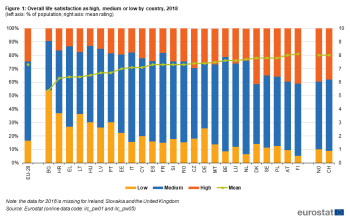Archive:High-tech statistics - employment
- Data extracted in December 2015. Most recent data: Further Eurostat information, Main tables and Database. Planned article update: (dd) Month YYYY(, hh:00).
This article analyses data on employment in high-technology (high-tech) sectors in the European Union (EU) and in some EFTA and candidate countries.
In the global race for competitiveness, it is essential to create, exploit and commercialise new technologies. High-tech sectors and enterprises are key drivers of economic growth and productivity, and generally provide high value-added and well-paid employment.
Main statistical findings
Employment in high-tech sectors
In 2014, just under 34 million people were employed in the manufacturing sector in the EU 28, representing 15.4 % of total employment. Of these, 2.3 million were employed in high-tech manufacturing, corresponding to 1.1 % of total employment. Over twice as many were employed in high-tech knowledge intensive services, which accounted for 2.8 % of total employment.
As a proportion of total employment, employment in the high tech manufacturing and services varied considerably from one country to another in 2014. In high-tech manufacturing, it ranged from 0.2 % in the Former Yugoslav Republic of Macedonia to 2.9 % in Malta and 3.0 % in Ireland. Differences in terms of the relative importance of high-tech knowledge-intensive services in total employment were also observed across countries. The biggest proportion (over 5 %) was recorded in Iceland and the smallest (under 2 %) in the former Yugoslav Republic of Macedonia, Lithuania, Romania and Turkey (Table 1).
At EU-28 level, the average annual growth rate (AAGR) for employment in high-tech sectors was negative over the 2008-2014 period. Comparing to manufacturing sector (where the decrease was 2.1 % a year), high-tech manufacturing sector recorded a slower fall of 1.3 % a year on average. This decrease can be partially explained by the economic crisis that hit Europe in 2010, the impact of which was also observed in the services sector, which recorded only slight growth of 0.5 % a year. At the same time, high-tech knowledge-intensive services showed some resilience to the crisis and recorded an average annual rise of 1.0 % in the number of jobs. Some important differences emerge when one compares employment changes in countries with significant growth on the one hand and equally significant decline on the other. Of 33 countries observed, 20 registered a fall in employment in high-tech manufacturing in 2008-2014, with the biggest fall (37.0 %) in the Former Yugoslav Republic of Macedonia, followed by a fall of 8.8 % in Portugal. Growth in high tech manufacturing was observed in the following eight countries: Turkey (6.7 %, in 2009-2014), Romania (4.7 %), Malta (3.8 %), the Czech Republic (3.1 %), Austria (2.2 %), Germany (1.4 %), Switzerland (0.9 %) and Denmark (0.7 %). The loss in high-tech knowledge-intensive services was much more moderate, with only four countries registering a decline: the Netherlands (-2.4 %), Spain (-0.8 %), Greece (-0.7 %) and Bulgaria (-0.2 %). The best-performing countries in terms of employment growth in high-tech knowledge-intensive services were the Former Yugoslav Republic of Macedonia (13.0 %), Turkey (9.3 %), Estonia (7.8 %) and Luxembourg (6.1 %).
Overall, roughly around one out of three employees in the high-tech sectors was a woman. However, the share of women was different in manufacturing and services (data for EU-28, 2014):
- There were more women in high-tech manufacturing than in manufacturing in general: 29.6 % of employees in manufacturing were women comparing to 38.2 % in high tech manufacturing. Five countries reported that over 50 % of all those employed in high-tech manufacturing were women (Estonia, Croatia, Bulgaria, Poland and the Czech Republic).
- In the high-tech knowledge-intensive services, the proportion of women (30.5 %) was lower than in the total services sector (54.4 %). No country achieved a gender balance. The lowest proportions were recorded in the Netherlands (23.0 %), Turkey (23.5 %) and the Czech Republic (24.2 %), the highest in Cyprus (44.4 %), Bulgaria (41.1 %) and Croatia (39.5 %). In particular the activities computer programming, scientific research and development, telecommunications and corresponding occupations still seem to attract more men than women.
Subdivision 2
Data sources and availability
<description of data sources, survey and data availability (completeness, recency) and limitations>
Context
<context of data collection and statistical results: policy background, uses of data, …>
See also
- Name of related Statistics Explained article
- Name of related online publication in Statistics Explained (online publication)
- Name of related Statistics in focus article in Statistics Explained
- Subtitle of Statistics in focus article=PDF main title - Statistics in focus x/YYYY
Further Eurostat information
Data visualisation
- Regional Statistics Illustrated - select statistical domain 'xxx' (= Agriculture, Economy, Education, Health, Information society, Labour market, Population, Science and technology, Tourism or Transport) (top right)
Publications
Publications in Statistics Explained (either online publications or Statistics in focus) should be in 'See also' above
Main tables
- Title(s) of second level folder (if any)
- Title(s) of third level folder (if any)
Database
- Title(s) of second level folder (if any)
- Title(s) of third level folder (if any)
Dedicated section
Methodology / Metadata
<link to ESMS file, methodological publications, survey manuals, etc.>
- Crime and criminal justice (ESMS metadata file — crim_esms)
- Title of the publication
Source data for tables, figures and maps (MS Excel)
Other information
<Regulations and other legal texts, communications from the Commission, administrative notes, Policy documents, …>
- Regulation 1737/2005 (generating url [http://eur-lex.europa.eu/LexUriServ/LexUriServ.do?uri=CELEX:32005R1737:EN:NOT Regulation 1737/2005]) of DD Month YYYY on ...
- Directive 2003/86/EC (generating url [http://eur-lex.europa.eu/LexUriServ/LexUriServ.do?uri=CELEX:32003L0086:EN:NOT Directive 2003/86/EC]) of DD Month YYYY on ...
- Commission Decision 2003/86/EC (generating url [http://eur-lex.europa.eu/LexUriServ/LexUriServ.do?uri=CELEX:32003D0086:EN:NOT Commission Decision 2003/86/EC]) of DD Month YYYY on ...
<For other documents such as Commission Proposals or Reports, see EUR-Lex search by natural number>
<For linking to database table, otherwise remove: {{{title}}} ({{{code}}})>
External links
Notes
[[Category:<Subtheme category name(s)>|Name of the statistical article]] [[Category:<Statistical article>|Name of the statistical article]]
